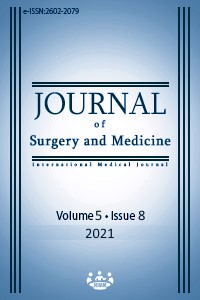Plexin C1: A novel screening test for lung cancer
Keywords:
Lung cancer, Plexin C1, Biomarker, TumorAbstract
Background/Aim: Lung cancer, where early diagnosis is particularly important, is one of the leading causes of death worldwide. Unfortunately, patients with lung cancer present at advanced stages. Biomarkers are needed to detect cancer at an earlier stage. In the present study, we aimed to emphasize that Plexin C1 level can be used in the early diagnosis of patients with lung cancer. Methods: This prospective case-control study included 50 patients with lung cancer who presented between May 2020-September 2020 (25 males and 25 females) in the patient group and 40 healthy individuals (23 males and 17 females) in the control group. All patients with lung cancer underwent routine preoperative tests. Additionally, the preoperative Plexin C1 levels of all patients were measured with the ELISA method and compared between the patient and control groups, and with respect to cancer staging. Results: The median Plexin C1 levels in the patient and control groups were 9.5 ng/mL and 4.0 ng/mL, respectively (P<0.001). The patients with Stage 4 tumors had significantly higher serum Plexin C1 levels than those with Stage 1, Stage 2, and Stage 3 tumors (P<0.001). Also, Plexin C1 levels were higher in patients with greater depth of invasion (P<0.001), more lymph node involvement (P<0.001), and distant metastasis (P<0.001). Conclusion: Plexin C1 can be used as a predictive biomarker at the time of diagnosis for lung cancer, and for cancer stage discrimination to show early, advanced, or metastatic disease.
Downloads
References
Siegel R, Naishadham D, Jemal A. Cancer statistics, 2012. CA Cancer J Clin. 2012;62:10-29. doi: 10.3322/caac.20138.
Siegel R, Miller KD, Jemal A. Cancer statistics, 2018. CA Cancer J Clin. 2018;68:7-30. doi: 10.3322/caac.21442.
Wulfkuhle JD, Liotta LA, Petricoin EF. Proteomic applications for the early detection of cancer. Nat Rev Cancer. 2003;3:267-75. doi: 10.138/nrc1043.
Kulpa J, Wojcik E, Reinfuss M, Kolodziejski L. Carcinoembryonic antigen, squamous cell carcinoma antigen, CYFRA 21-1, and neuron-specific enolase in squamous cell lung cancer patients. Clin Chem. 2002;48:1931-7.
Schneider J. Tumor markers in detection of lung cancer. Adv Clin Chem. 2006;42:1-41.
Okada M, Nishio W, Sakamoto T, Uchino K, Yuk, T, Nakagawa A, et al. Prognostic significance of perioperative serum carcinoembryonic antigen in non-small cell lung cancer: Analysis of 1000 consecutive resection for clinical stage I disease. Ann Thorac Surg. 2004 Jul;78(1):216-21. doi: 10.1016/j.athoracsur.2004.02.009.
Aydın S, Balcı A. The effect of bone metastases on survival in lung cancer. J Surg Med. 2020;4(11):965-9.
Diez M, Cerdan FJ, Ortega MD, Torres A, Picardo A, Balibrea JL. Evaluation of serum CA 125 as a tumor marker in non-small cell lung cancer. Cancer 1991;67:150-4. doi: 10.1002/1097-0142(19910101)67:1<150::AID-CNCR2820670126>3.0.CO;2-D.
Rifai N, Gillette MA, Carr SA. Protein biomarker discovery and validation:The long and uncertain path to clinical utility. Nat Biotechnol. 2006;24:971-83. doi: 10.1038/nbt1235.
Makawita S, Diamandis EP. The bottleneck in the cancer biomarker pipeline and protein quantification through mass spectrometry-based approaches: Current strategies for candidate verification. Clin Chem. 2010;56:212-22. doi:10.173/clinchem.2009.127019.
Asamura H. Lung, pleural, and thymic tumors. In: TNM Classification of Malignant Tumors; 8th edition. Brierley JD, Gospodarowicz MK and Wittekind C (ed.) John Wiley & Sons, Ltd., West Sussex; 2017.pp.105-118.
Neufeld G, Kessler O. The semaphorins: versatile regulators of tumor progression and tumor angiogenesis. Nat Rev cancer. 2008;8:632-45.
Negishi M, Oinuma I. Semaphorin Receptors and Their Signaling. In: Kumanogoh A, editor. Semaphorins. Tokyo: Springer; 2015.pp.1-17.
Tamagnone L, Artigiani S, Chen H, Z He, G I Ming, H Song , et al. Plexins are a large family of receptors for transmembrane, secreted, and GPI-anchored semaphorins in vertebrates. Cell. 1999;99(1):71–80. doi: 10.1016/S0092-8674(00)80063-X.
Odabas G, Cetin M, Turhal S, Baloglu H, Sayan AE, Yagci T.Plexin C1 Marks Liver Cancer Cells with Epithelial Phenotype and Is Overexpressed in Hepatocellular Carcinoma. Can J Gastroenterol Hepatol. 2018 Sep 19;2018:4040787.
Sakurai A, Doci C, Gutkind JS. Semaphorin signaling in angiogenesis, lymphangiogenesis and cancer. Cell Res. 2012;22:23-32.
Gelfand MV, Hong S, Gu C. Guidance from above: commoncues distinct signaling outcomes in vascular and neural patterning. Trends Cell Biol. 2009;19:99-110.
Serini G, Napione L, Arese M, Bussolino F. Besides adhesion: new perspectives of integrin functions in angiogenesis. Cardiovasc Res. 2008;78:213-22.
Barberis D, Artigiani S, Casazza A, Corso S, Giordano S, Love CA, et al. Plexin signaling hampers integrin-based adhesion, leading to Rho-kinase independent cell rounding, and inhibiting lammelipodia extension and cell motility. FASEB J. 2004;18:592-94.
Peng X, Moore M, Mathur A, Zhou Y, Sun H, Gan Y, et al. Plexin C1 deficiency permits synaptotagmin 7–mediated macrophage migration and enhances mammalian lung fibrosis. FASEB J. 2016 Dec;30(12):4056–70.
Turhal SN, Dogan M, Esendagli G, Artac M, Korkmaz L, Coskun HS, et al. The Relationship Between Plexin C1 Overexpression and Survival in Hepatocellular Carcinoma: a Turkish Oncology Group (TOG) Study. J Gastrointest Canc. 2021 Mar 3. doi: 10.1007/s12029-021-00602-4.
Ni Z, Huang C, Zhao H, et al. PLXNC1: A Novel Potential Immune-Related Target for Stomach Adenocarcinoma. Front Cell Dev Biol. 2021;9:662707.
Chen J, Liu H, Chen J, Sun B, Wu J, Du C. PLXNC1 Enhances Carcinogenesis Through Transcriptional Activation of IL6ST in Gastric Cancer. Front Oncol. 2020 Feb 4;10:33. doi: 10.3389/fonc.2020.00033.
Downloads
- 486 436
Published
Issue
Section
How to Cite
License
Copyright (c) 2021 Duygu Mergan İliklerden, Buket Mermit Çilingir
This work is licensed under a Creative Commons Attribution-NonCommercial-NoDerivatives 4.0 International License.
















